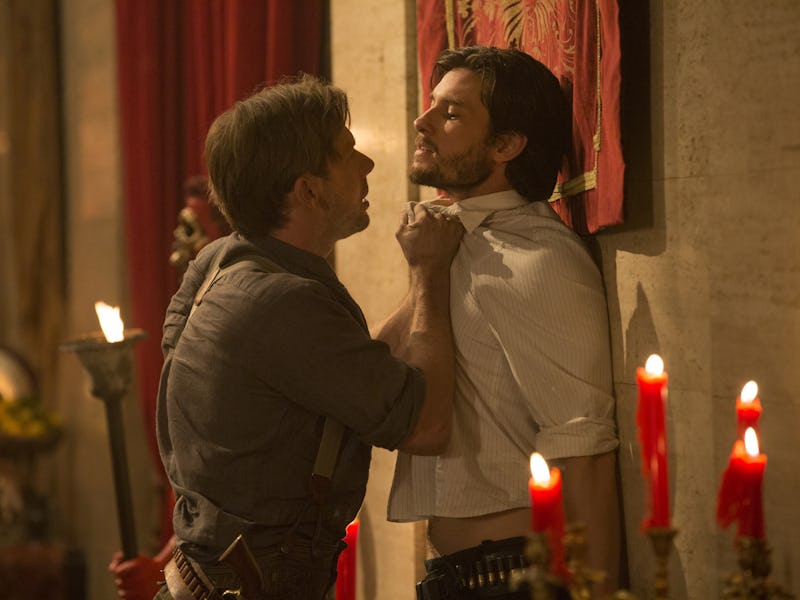William on 'Westworld' Is the Ultimate Toxic "Nice Guy"
The story about William and the Man in Black has some very modern commentary on masculinity.

Depending on what kind of Westworld viewer you are, Season 1’s story of William’s evolution from the idealistic White Hat to the sadistic Man in Black was either a surprising twist or a triumphant confirmation of your deductive skills. But, whether or not you parsed it out beforehand, it isn’t a turn the story took merely for the sake of drama. Rather, William’s transformation can be read as a continuation of Westworld’s surprisingly sharp commentary on gender roles.
If Dolores and Maeve illustrate what the constraints of marginalization can do to individuals, William embodies the ultimate “nice guy” archetype, otherwise known as a “white knight.” It’s unfortunately a type many women know all too well.
Now, being a “kind” man is not a negative thing. Let’s get that out of the way first. But the term “nice guy” — usually accompanied by scare quotes — is a recent form of critique for a particular variety of male entitlement. Nice Guy Syndrome, as it’s also called, is essentially the John Hughes movie mentality manifested in the real world: oddball Ducky in Pretty in Pink “losing” the girl to the popular jerk despite his steady friendship with her. He’s been cheated, the audience comes to believe.
Buffy the Vampire Slayer built an entire season around this mode of thought with its Season 6 villains, the Trio. They begin the show as stereotypes — soft-spoken nerds who never get the girl — but quickly become horrifying when their attempts to gain power include date rape and the obsessive use of sex robots. Ron Weasley even pulls his own “nice guy” move in Harry Potter when he lashes out at Hermione for attending the Yule Ball with Quidditch star Victor Krum. How dare the female character opposite a “nice guy” choose something other than what he wants? Hasn’t he acted in the correct way, cinching her loyalty by treating her well?
Can’t the underdog get the girl for once, these stories ask. Isn’t he entitled to sex as a reward for his friendship? The /r/redpill subreddit exists simply for “nice guys” (some calling themselves “beta males”) to parse through why they’re so often rejected.
As portrayed by Jimi Simpson, William enters Westworld as the ultimate Nice Guy. He’s not aggressive like his associate Logan (Ben Barnes). He’s shy and respectful towards the female hosts who come onto him. In other words, he’s nice! He doesn’t embrace sexist bullshit. As he strikes up a relationship with Evan Rachel Wood’s lost-girl host Dolores, he becomes entangled in her quest to find herself.
Dolores and William
In the Season 1 finale, when it is revealed that William and the Man in Black are one and the same, we learn that his transformation from White Hat to Black Hat happened when became separated from Dolores. Talking about himself in the third person, Ed Harris’s Man in Black tells Dolores, “William didn’t know how to fight; didn’t have an instinct for it … not at first. But now he had a reason to fight — he was looking for you.”
Dolores never needed saving; she was after self-actualization. But the heart of the “Nice Guy” mentality is when a man who is not stereotypically “alpha” pretends to care about a woman — often convincing himself he does — while in reality, he uses her as a means of justifying his own bad behavior. His notions of his own masculinity are tied to his support of the woman and his sense of inferiority towards the alpha male who usually does get the girl.
Tellingly, although William is supposedly on a quest to “save” Dolores, the climax of his story does not involve her presence at all. Rather, he strips and humiliates snarky, handsome, company-owner Logan to assert his dominance over him.
William the Black Hat
If William merely flipped from White Hat to Black Hat because of his own experiences, that would render him an ordinary villain — it’s his use of Dolores to justify his sadistic actions that makes him a “nice guy.”
When he spots Dolores in town after he’s turned to Black Hat, he is enraged to see her smiling and talking with another man, as she once did with him. She owes him her smile and conversation because he went on that quest for her, right? Put in that context, in the pilot episode when Ed Harris’s older version of William assaults Dolores, we can presume that he’s taking what he feels he is owed.
For a show adapted from a niche ‘70s movie about killer robots, Westworld has found the pulse of today’s most pressing gender debates. Whether or not Season 2 strays into Samurai World, it’s sure to pack violent delights both on- and off-screen.